#8: Losing the Threads
Navigating what it means to build an identity online without collapsing our personalities into digestible bytes
Ever since Elon Musk’s Twitter Takeover, tech freaks (complimentary) and the terminally online (also complimentary) have been searching for the next online community. Half-hearted attempts to populate Mastodon, Bluesky, and other digital venues surge when Musk does something particularly transgressive and/or dumb, but we can’t seem to quit that little blue bird app with a certain je ne sais quoi.
The most recent challenger is Threads. Last week, the app saw over 100 million sign-ups, coinciding with Musk’s announcement that tweet consumption will be limited for non-paying users. I clicked a sign-up link—because why not—only to discover the app was Meta-backed. I exited my tab, unimpressed. I’ve been on an Instagram hiatus much of the year for the usual boring reasons (spikes in app-related anxiety and sadness) and engaging with yet another tentacle of the Meta Monster was vv unappealing.
My third eye must have been particularly clear that day because as many unhappy users found out, Threads is directly linked to your IG profile which means (1) all your followers now automatically follow your Threads profile and (2) deleting your Threads account automatically deletes your IG. This is a wild choice on Meta’s part. Not so much the automatic deletion, that’s just an aggressive (and sort of mean) user retention tactic. Rather, Meta’s miscalculation that users want to be static personas across social media.
Of course, this could all be by design, to paint a more comprehensive data portrait of users for Meta to profit from. But maybe it’s not mutually exclusive, maybe Meta really does think users want a central social media hub, a body if you will, to support varying online vital functions. They certainly bet money on people’s interest in an immersive and interconnected web experience with the Metaverse.

The thing is, the separation of personas is social media’s saving grace, a failsafe that protects users’ many-splendored idiosyncrasies. I am not the same person I am on TikTok as I am on Instagram as I am on Reddit. I shudder to think about friends and family and peers and coworkers being privy to every side of Digital Me. The same thing happens in real life. Our work selves are very different from our weekend selves and never shall the two meet. Yet even if those boundaries slip, they’re presented with context and nuance. Whole people offline are a lot easier to fit in our heads than whole people online.
My online activity is tame… but it is weird. I love Sylvanian Dramas. I give my opinions freely about Lip Sync Battles on the Drag Race subreddit. I watch hours of Defunctland documentaries because despite nearly failing Operations Management, I’m addicted to theme park queueing content. I get my breaking news updates from Liza Minnelli Outlives. If my mom read this paragraph, she’d understand mayyybeee ten percent of it. Even certain peers would be lost trying to decipher my daily online activities. And I prefer it that way. The gift the Internet affords us is an arena in which to discover and enjoy the multitudes of self and connect with strangers who share similar interests. Critics blame social media for destroying our interpersonal relationships—I agree—but it’s important to highlight the many areas of the internet where people have found connection.
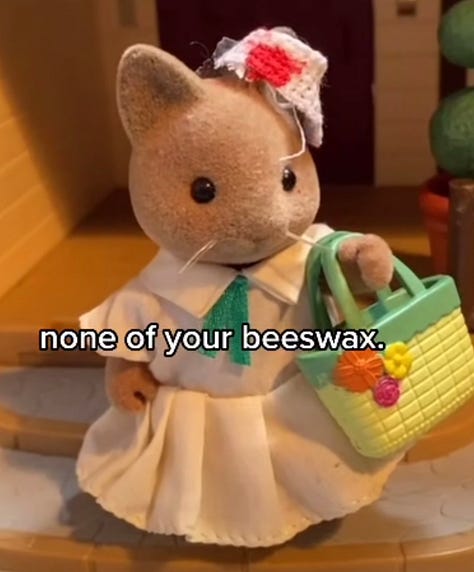
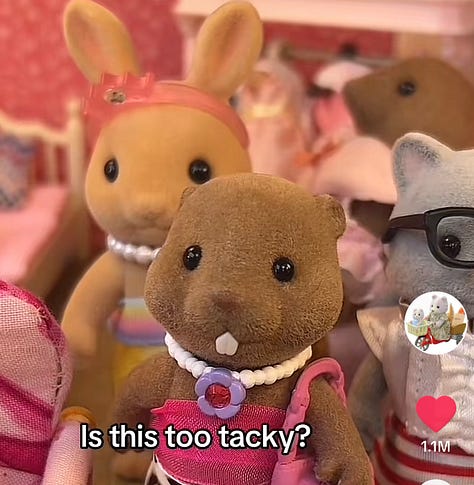
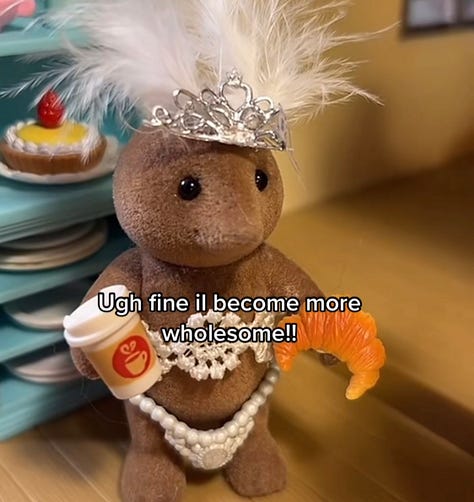
I was reminded of this the other night when I used a medication that produced comically horrible side effects. As I frantically googled the medicine (to see if I inadvertently poisoned myself ofc) I came across a series of user reviews on Drugs.com, each more creative and preposterous than the last, all validating that I was not alone in my intense suffering and there was some humor to be found in this temporary situation. Most of us had found this forum in the middle of the night, cursing the brand that landed us here. Divided by space and time, we bonded through our pain and the promise of a class action suit and/or a collective hexing.
I wonder if these genuine moments of connection can only happen when our internet self is one step removed from our real selves. A piece of us connects with a piece of someone else; an attempt to align on any more pieces from behind a screen threatens or dilutes the connection. Like expecting a favorite TikToker to be interesting to talk to in person. Sometimes that’s just not the case. Appreciate where you overlap, what you admire about them, and shrug off the rest.
And vice versa! I know a number of wonderful people that I love to spend time with but when we meet online I think, Is this who you are? I don’t recognize you here. I’m not even sure I like you here? This dissonance used to be disorienting until I read author Mel Robbins’ take: “Your social media is not for your friends. Your social media is for you and your dreams and your self expression and it’s meant to put something out in the world intentionally so people who are looking for you and who need you can find you.” Now I see those digital pieces of friends and celebrate their self expression while acknowledging that I’m not the target audience. And I apply the same freedom to my own work, knowing close friends might not connect with it. It’s easier to do, though, when those spaces are fixed and separate.
–––––
The most fun I ever had on Instagram was during graduate school. I deleted my original IG after college and had a mostly dormant account I used for work. Starting business school, an influx of follow requests hit my inbox and, caving to good manners, I accepted and followed back. Surprisingly, the platform became enjoyable. The FOMO barrier was essentially removed because I was invited to all the same events as my classmates. It was an expedient and convenient space for information sharing. Insightful posts and enthusiastic engagement (re: drunkenly responding to Stories at 2am) turned acquaintances into friends. My user experience was changed and made richer because my online community mimicked my offline one.
As a supplementation to a social life, Instagram was great. When it became the only means of connecting with some people, I lost interest, which explains why I’m once again less active on the platform. Catching up with an old friend recently, I told her about a big life update. She grabbed for her phone, apology mode activated, “Wait, did you post about that? I’m so sorry I missed!” I told her, no, no, this was me telling her. I marveled at how strange it is that we’ve normalized detached announcements to hundreds (thousands?) of people in place of sharing intimate news with close friends.
I’ve lived through LiveJournal and MySpace and Tumblr and Blogger so I’ve always viewed social sites as a time capsule1, not an opportunity for building lasting identity capital. They’re silly, messy, dated snapshots of my life. I look back on old blog posts and, though I cringe, I definitely don’t denounce them. Instead, I see all the ways my thinking has shifted or expanded. Not net positive or negative, just neutral. I’m comforted knowing those profiles are separated from me as I am today, not readily searchable or traceable. I also like knowing that they still exist.

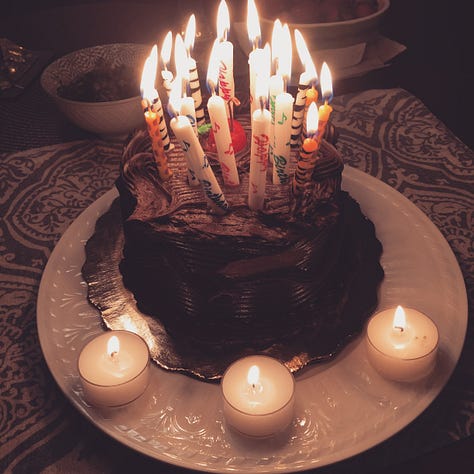
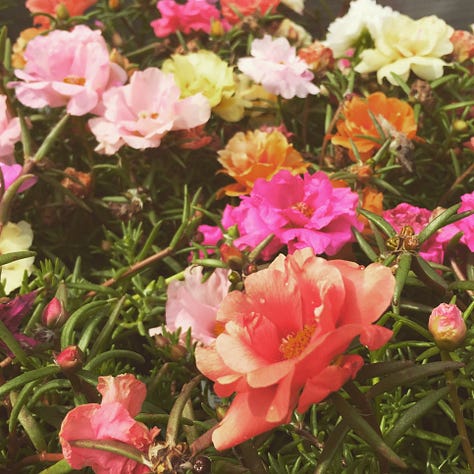
Somewhere along the way social media became a branding exercise. A cheat sheet for understanding and evaluating someone.2 Pruned and sanitized for maximum likability, to the extent that younger generations scrub their grids of old photos that no longer speak to their inclinations or “vibe”. They don’t have the ability to desert platforms as I did— abandoning Tumblr Sarah to make way for Pinterest Sarah—because these platforms have more permanence now. Instagram is their calling card, the same as brands.
I struggle so much with this. I don’t wish to recreate my entire self online. I work, ergo I have a LinkedIn persona. I watch movies, ergo I have a Letterboxd persona. But what if I didn’t? I'd still be a working professional. I’d still be a devoted filmgoer. Does the culmination of my internet presence equate to a total understanding of Sarah Lambert? Of course not, but as the majority of our activities migrate online, it’s getting really hard to differentiate. When our online expressions are shorthand for our personalities, some people forget that we might have interests beyond what we post about online.
Our ineffable qualities are likewise lost in translation. How can you begin to construct a profile that accurately portrays inquisitiveness, kindness, charisma, level headedness? Our human dynamism exchanged for social media static. I think only in keeping these online spheres separate can we preserve our dimensionality offline. Lest we all meet as flattened versions of ourselves in real life.
–––––
I was excited to see Chris Black’s column “Twitter is Better Than Ever” in GQ, where his views are similar to my own. He writes,
[I]nstead of any edge, genuine humor, or insight, the shiny new platform [Threads] will deliver a bunch of bland text-forward posts from people who don't really know how to write but do know how to expertly posture about having a unique new online “space” just for them… Instagram and Twitter serve different functions and showcase different sides of users' personalities. The last thing I want to read is some brain-dead influencer’s thoughts about anything.
I get it. My Twitter and Substack feeds are the result of careful curation, a collection of smart, funny writers, artists, and thought leaders. Threads, in all its intermixed chaos, doesn’t fit the bill or, frankly, attract the talent. It’s like a destination billed as a getaway, only when you get there all your friends and family members and coworkers and influencers are already present.
Twitter may be a sinking ship, but I love every minute I spend suspended from its stern. There I’m free to be a refraction—not a reflection—of myself. (Save me if a physicist ever reads this newsletter, I think this metaphor holds?) What’s projected there and elsewhere on social media isn’t a mirror image of me. It’s just light filtered through me, bent and changing depending on the conditions.
In summary: Break the monotony. Do something strange and extravagant! Keep being lil freaks on the Internet!!!!!!!!!!
Clearly excluding racist, homophobic, xenophobic etc posts. No excuse for ill-intentioned tweets no matter the decade
At this I think of an old teacher who wished she could hand everyone she met a pamphlet or “How To” guide to save time and energy explaining her history, preferences, and (difficult) personality. Her dream was sort of realized??


